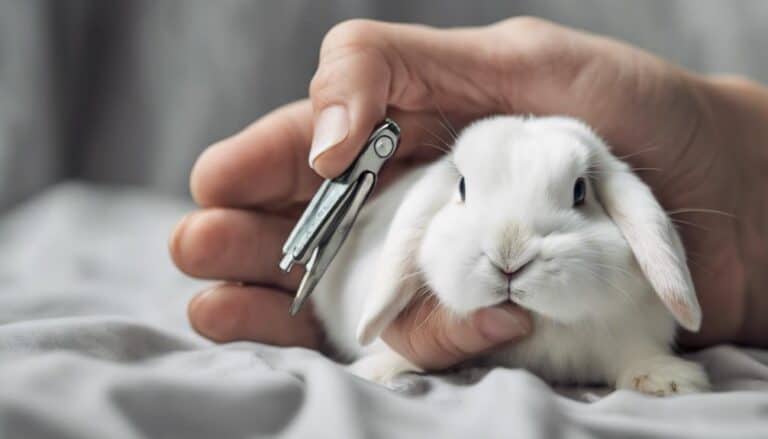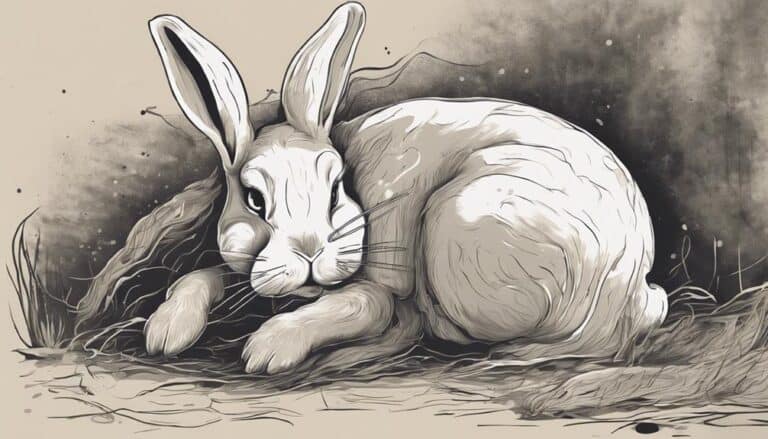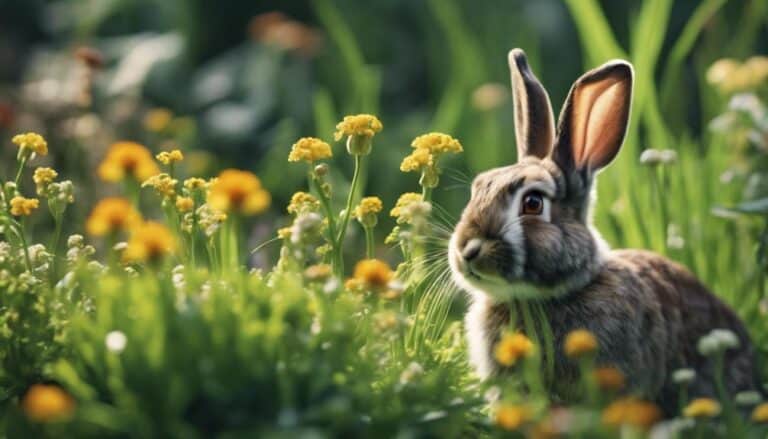As a responsible bunny caregiver, you may wonder about the suitability of carrots for your 8-week-old furry companions. While the vibrant orange vegetable can be enticing for young rabbits, there are important considerations to keep in mind.
Carrots offer some nutritional benefits, but their introduction to such young bunnies requires caution. Understanding the delicate balance between treats and a balanced diet is key to ensuring the health and well-being of your growing bunny.
So, what should you know before offering these crunchy delights to your little hopper? Stay tuned to discover the dos and don'ts of incorporating carrots into a young bunny's diet.
Contents
- 1 Key Takeaways
- 2 Bunny Age and Carrot Consumption
- 3 Nutritional Benefits of Carrots for Bunnies
- 4 Risks of Feeding Carrots to Young Bunnies
- 5 Introducing Carrots to 8-Week-Old Bunnies
- 6 Moderation in Carrot Feeding for Bunnies
- 7 Signs of Carrot Allergies in Young Bunnies
- 8 Alternatives to Carrots for Young Bunnies
- 9 Consulting a Vet About Bunny Diet
- 10 Frequently Asked Questions
- 11 Conclusion
Key Takeaways
- Start with small amounts of carrots as a treat to prevent digestive issues.
- Monitor closely for tolerance to high sugar content in carrots.
- Treat carrots as a special addition, not a staple food for young bunnies.
- Consult a vet if severe reactions or allergies occur when feeding carrots.
Bunny Age and Carrot Consumption
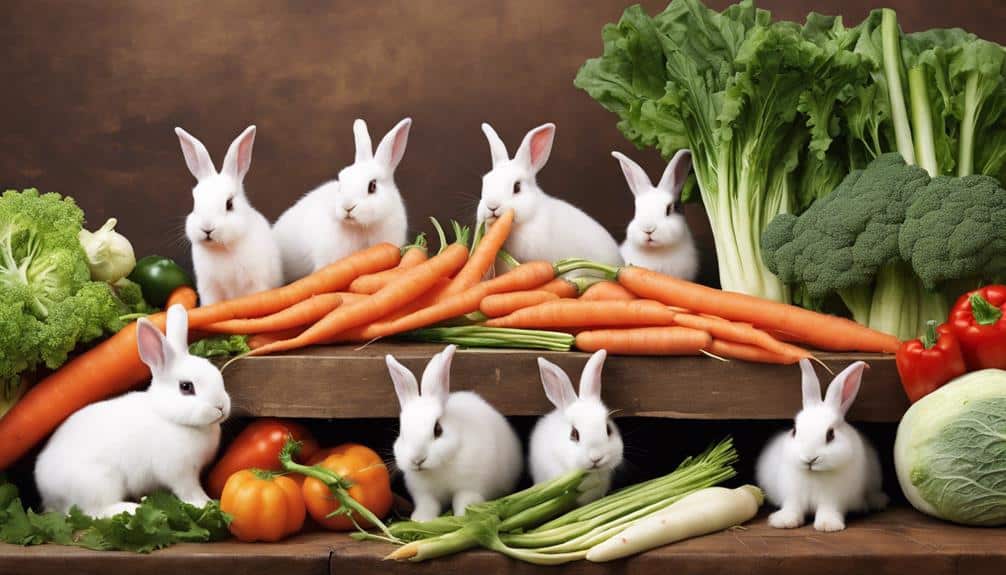
When can 8-week-old bunnies safely begin consuming carrots as part of their diet?
At 8 weeks old, baby bunnies can start eating small amounts of carrots as a treat.
However, it's important to introduce carrots gradually to avoid digestive issues.
Carrots are high in sugar, so they should be given sparingly to 8-week-old bunnies to prevent any potential health issues.
Monitoring your bunny closely when introducing carrots into their diet to make sure they tolerate them well.
While carrots can be a tasty and nutritious addition to an 8-week-old bunny's diet, moderation is key to prevent any adverse effects from the high sugar content.
Remember to treat carrots as a special addition to your bunny's diet rather than a staple food item to maintain their overall health and well-being.
Nutritional Benefits of Carrots for Bunnies
Moving on from the discussion of Bunny Age and Carrot Consumption, let's explore the nutritional benefits that carrots offer to bunnies. Carrots are a rich source of Vitamin A, important for maintaining good vision and a robust immune system in rabbits.
Additionally, the fiber present in carrots plays an essential role in supporting healthy digestion in bunnies. The crunchy texture of carrots also aids in wearing down a rabbit's teeth, which continuously grow, helping to prevent dental issues.
However, it's important to exercise moderation when feeding carrots to young bunnies due to their high sugar content. Introduce carrots gradually to 8-week-old bunnies to prevent digestive upsets that can arise from a sudden change in diet. By offering carrots in appropriate amounts, you can provide your young bunny with essential nutrients while also helping to maintain their dental health.
Risks of Feeding Carrots to Young Bunnies
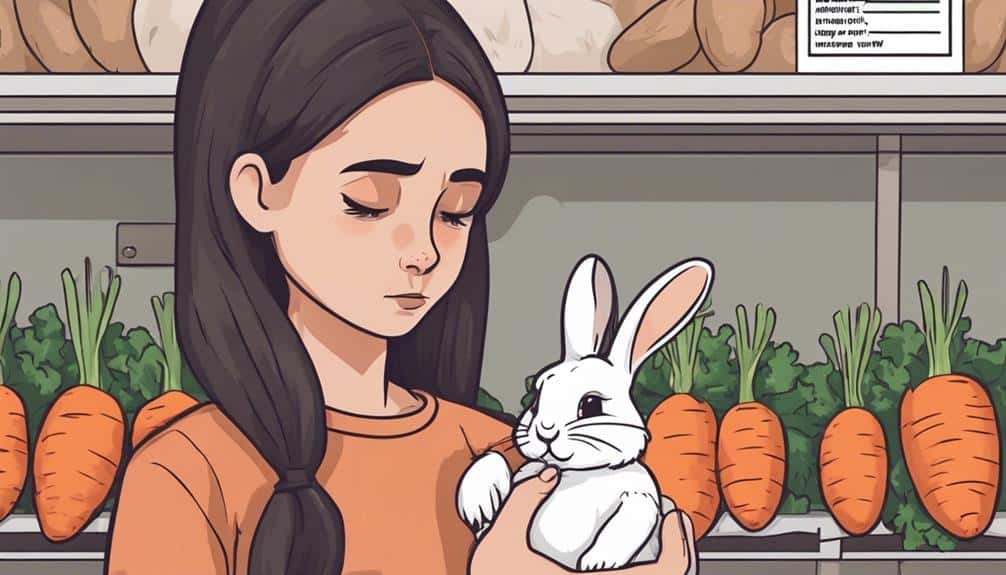
Feeding young bunnies carrots poses risks due to their high sugar content, which can potentially disrupt their sensitive digestive systems. Carrots, while a favorite treat for many bunnies, should be introduced gradually and in small amounts to prevent digestive issues. Monitoring your young bunny closely when offering carrots to make sure they are well-tolerated. Remember, carrots should be considered a treat rather than a staple in the diet of young rabbits. Keeping an eye on your bunny's droppings and behavior can provide valuable insights into how their digestive system is handling the introduction of carrots. By taking these precautions and being attentive to your bunny's reactions, you can help prevent any potential issues related to the high sugar content in carrots.
| Risks of Feeding Carrots to Young Bunnies | ||
|---|---|---|
| High Sugar Content | Digestive Issues | Introduce Gradually |
| Monitor Closely | Small Amounts | Consider as Treat |
Introducing Carrots to 8-Week-Old Bunnies
Introducing carrots to 8-week-old bunnies should be done cautiously and in small amounts to avoid potential digestive issues due to their high sugar content. Carrots can be a delightful treat for your young bunny, but it's vital to start slowly.
Begin by offering a small piece of carrot to observe how your bunny reacts. Keep a close eye on their digestion and stool after introducing carrots into their diet. Due to the high sugar content in carrots, it's essential to give them in moderation.
Gradually introducing carrots can help prevent digestive upsets in 8-week-old bunnies, ensuring their little tummies adjust well to this new treat. Remember, the key is moderation and monitoring your bunny's response to this tasty addition to their diet.
Moderation in Carrot Feeding for Bunnies
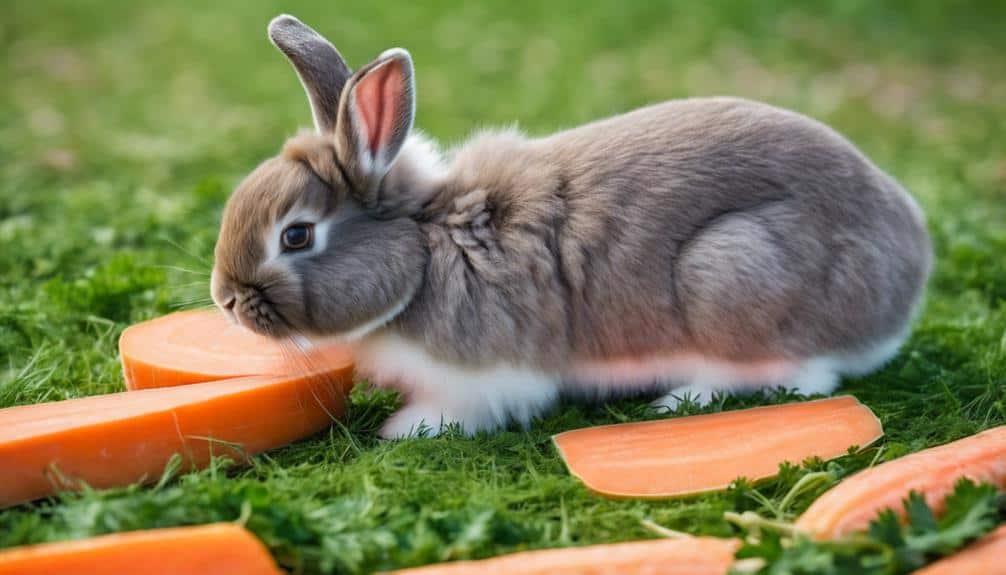
When offering carrots to 8-week-old bunnies, it is important to control the amount due to their high sugar content to prevent potential digestive issues. Carrots, while a tasty treat for bunnies, should not be their primary food source. Moderation is key when incorporating carrots into a young bunny's diet. Too many carrots can lead to digestive problems, so it's essential to monitor their intake carefully.
| Aspect | Consideration |
|---|---|
| Age of Bunnies | 8-week-old |
| Food Item | Carrots |
| Feeding Approach | Moderation |
| Risk | Digestive issues |
Signs of Carrot Allergies in Young Bunnies
If your 8-week-old bunny displays symptoms like diarrhea, bloating, or gas after eating carrots, they might be allergic. Monitor your bunny closely for signs of discomfort or pain, as severe carrot allergies can lead to gastrointestinal distress.
It's important to consult a veterinarian if you suspect your young bunny is experiencing adverse reactions to carrots.
Allergy Symptoms in Bunnies
For young bunnies, recognizing signs of carrot allergies is important for their well-being. Allergic reactions in 8-week-old bunnies can present as skin itching, redness, or hives after consuming carrots. In severe cases, difficulty breathing or anaphylaxis may occur, requiring immediate vet consultation.
Keep an eye out for signs of gastrointestinal upset like diarrhea, bloating, or gas post-carrot ingestion. Additionally, young bunnies with carrot allergies might display lethargy, loss of appetite, or unusual behavior.
If you suspect your 8-week-old bunny is allergic to carrots, it's essential to seek professional veterinary advice to determine the best course of action for their health and well-being.
Monitoring Bunny Reactions
To monitor potential carrot allergies in young bunnies, observe closely for signs of gastrointestinal distress and changes in behavior following carrot consumption. Watch for signs such as loose stool, gas, or bloating which may indicate an adverse reaction to carrots. Be alert to changes in behavior like reduced appetite or lethargy, as these could be linked to carrot allergies.
Check for any skin reactions or itching in young bunnies, as these may also be signs of an allergy. Keep an eye on the bunny's overall health and energy levels to detect any negative effects from eating carrots. Remember, if you notice persistent negative reactions in 8-week-old bunnies after feeding them carrots, consult a veterinarian promptly.
Consulting a Vet
When observing young bunnies for signs of carrot allergies, consult a veterinarian promptly if you notice symptoms like diarrhea, bloating, or changes in behavior. It's essential to monitor your 8-week-old bunny closely, especially when introducing new foods like carrots. To emphasize the importance of consulting a vet, consider the following table:
| Consulting a Vet for Carrot Allergies in 8-Week-Old Bunnies | ||
|---|---|---|
| Diarrhea | Bloating | Changes in Behavior |
| Gas | Digestive Issues | Monitor Stool |
Alternatives to Carrots for Young Bunnies
Young bunnies can enjoy a variety of safe vegetable options such as beet tops, watercress, sprouts, parsley, and wheatgrass. These alternatives not only provide essential nutrients but also introduce a diverse range of flavors into their diet.
Ensuring a balanced intake of nutritious fruits and vegetables helps young bunnies develop healthy eating habits.
Safe Vegetable Options
Consider offering beet tops, watercress, sprouts, parsley, and wheatgrass as safe vegetable alternatives for 8-week-old bunnies instead of carrots. These vegetables provide essential nutrients without the high sugar content found in carrots. Introducing a variety of safe vegetables guarantees a balanced diet for young bunnies.
These vegetable options help young bunnies explore different flavors and textures while maintaining their health. Offering a range of vegetables encourages young bunnies to develop a diverse palate and enjoy a variety of foods.
- Beet tops
- Watercress
- Sprouts
- Parsley
- Wheatgrass
Nutritious Fruit Choices
To guarantee high-quality nutrition for your 8-week-old bunnies, explore nutritious fruit options such as apples, papaya, and berries as alternatives to carrots. When choosing fruits for young bunnies, consider options like strawberries, raspberries, and blueberries as occasional treats due to their lower sugar content. Limiting high-sugar fruits and focusing on small portions of safe choices is crucial. Apples can be a suitable alternative to carrots for 8-week-old bunnies because of their moderate sugar levels. Remember to introduce fruits gradually to monitor your bunnies' digestive reactions and maintain balanced nutrition. Below is a table showcasing some nutritious fruit choices for your young bunnies:
| Fruit | Sugar Content | How to Introduce |
|---|---|---|
| Apples | Moderate | Offer small slices |
| Papaya | Low | Mash a small amount |
| Berries | Varies | Start with one at a time |
Consulting a Vet About Bunny Diet
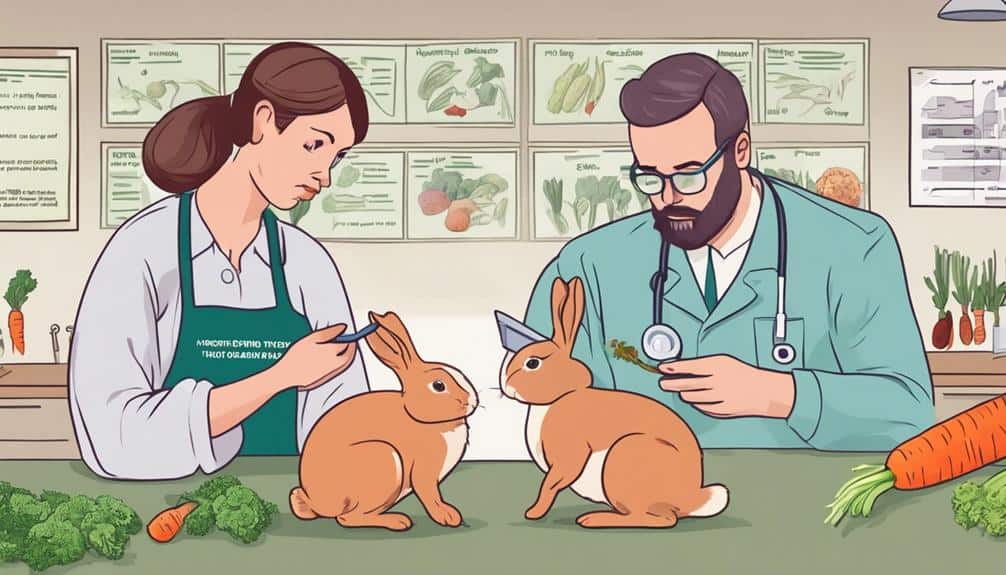
When seeking guidance on your 8-week-old bunny's diet, consulting a veterinarian is important for ensuring excellent health and nutritional balance. Vets can provide personalized advice based on your bunny's specific health needs. Here are some reasons why consulting a vet about your bunny's diet is critical:
- Personalized Advice: Vets can provide tailored recommendations based on your bunny's individual requirements.
- Safe Food Introduction: They can guide you on how to safely introduce new foods like carrots into your bunny's diet.
- Monitoring and Adjustment: Vets can help monitor your bunny's reaction to carrots and make necessary adjustments to the diet.
- Balanced Diet: Seeking veterinary guidance guarantees that your bunny receives a balanced diet suitable for their age.
- Appropriate Nutrition: Vets can ensure that the diet is appropriate for your 8-week-old bunny's nutritional needs.
Consulting a vet is a proactive approach to guaranteeing your bunny's diet is excellent for their growth and well-being.
Frequently Asked Questions
What Do You Feed an 8 Week Old Rabbit?
For an 8-week-old rabbit, guarantee a balanced diet with pellet preference, varied hay, ample water, growth milestones tracking, treat options in moderation, digestive health monitoring, exercise provision, possible vitamin supplements, and a consistent feeding schedule.
What Veg Can a 9 Week Old Rabbit Eat?
You can feed a 9-week-old rabbit a variety of veggies like spinach treats, bell pepper snacks, cucumber slices, kale diet, zucchini pieces, parsley nibbles, radish tops, broccoli florets, and celery sticks. Monitor their digestion for any issues.
Can 1 Month Old Rabbit Eat Vegetables?
When can a young rabbit eat vegetables? At 1 month, start introducing veggies like leafy greens. Monitor for digestive issues. Offer fruit treats in moderation. Focus on a hay diet for nutrition needs. Be mindful of dietary restrictions.
Can 7 Week Old Bunnies Eat Lettuce?
Yes, 7-week-old bunnies can eat lettuce, including spinach leaves, cilantro sprigs, kale chips, arugula mix, radish greens, dandelion leaves, parsley bunch, beet tops, and Swiss chard. Introduce gradually and rotate with other safe veggies for a balanced diet.
Conclusion
To sum up, while 8-week-old bunnies can eat carrots in moderation, it's important to be cautious due to their high sugar content. Despite the nutritional benefits carrots can provide, overfeeding may lead to digestive issues in young rabbits. Remember, what may seem like a treat can quickly turn into a health concern.
Always consult with a vet to make sure your bunny's diet is balanced and suitable for their delicate systems.

